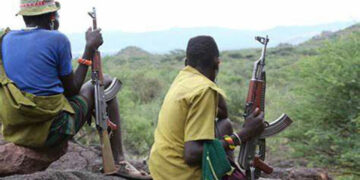National coordinator of the African Technology Policy Studies Network (ATPS), Nigeria, Prof Michael Madukwe, has said intensifying climate threats, extreme droughts, floods, rising temperatures and soil degradation undermine food security and livelihoods among smallholder farmers in Nigeria.
He stated this during a training session for farmers, agricultural extension agents, and researchers to support inclusive knowledge brokering and increased client resilience in Abakaliki, the capital of Ebonyi State.
He said Nigeria risks a 10-25% decline in agricultural productivity by 2080.
Prof Madukwe, who represented the executive director (ATPS) Nairobi, Prof Nicholas Ozor, said that the project’s goal is to strengthen the extension system’s capacity to use proven knowledge and technologies to sustain equitable, locally led adaptation among smallholder farming communities in selected West African countries.
He said that ATPS is partnering with the Initiative Prospective Agricole et Rurale (IPAR) in Senegal and the West Africa Green Economic Development Institute (WAGED) in Nigeria.
The initiative, termed the SCALE project, is funded by the International Development Research Centre (IDRC). It addresses systemic failures by strengthening the extension system’s role as a knowledge broker for equitable Locally Led Adaptation (LLA).
Prof Madukwe hinted that the workshop is a follow-up to a data collection process that involved the key stakeholders, the validation of the report emanating from the collected data, and co-design sessions using farmer feedback loops, among other things.
“Smallholder farmers in Nigeria face intensifying climate threats, extreme droughts, floods, rising temperatures, and soil degradation—undermining food security and livelihoods.
Prof Madukwe, who is a lecturer at the Department of Agricultural Extension, University of Nigeria, Nsukka, said that these challenges disproportionately affect marginalised groups (women, youth, and persons with disabilities), who lack decision-making power in top-down adaptation interventions.
“Critically, agricultural extension systems are crippled by severe under-resourcing; Nigeria has just one extension agent per 5,000 farmers (vs. one per 400 in Europe), exacerbated by funding gaps, weak actor linkages, and inadequate technical capacity.
He said the training is to respond to validated needs assessments revealing critical gaps in access to climate-resilient technologies, GESI-responsive knowledge sharing, multi-actor collaboration frameworks, digital literacy, and financial literacy.
He maintained that by bridging these gaps, the initiative empowers stakeholders to co-design and sustain context-specific adaptation, directly aligning with Nigeria’s national priorities.
“The training goal will strengthen the capacity of farmers, extension agents, and researchers to co-generate, transfer, and adopt proven LLA technologies, ensuring equitable and inclusive climate resilience.
“The specific objectives will help build technical competencies in climate-smart agriculture, agroecology, and digital tools.
“The goals will also enhance collaboration among researchers, extension agents, and farmers for co-designing solutions. Integrate GESI principles into adaptation planning and resource allocation. Improve access to climate finance and policy advocacy capabilities.
In his presentation, the project officer of SCALE, Prof Joel Nwakaire, encouraged rural Farmers, especially in the South East, to procure homegrown irrigation technology for all-season farming.
“I believe that our homegrown technology, which is locally made and quite affordable, will help our rural Farmers in their yearly farming season.
“The technology is locally driven and adapted for rural farmers, who can operate it using text messages through their phones.”
Prof Nwakaire maintained that agroecology and crop rotation are most suitable for rural farmers, adding that multi-cropping is most practised in the region because of land availability.
Agroecology and crop rotation enhance soil rejuvenation, but multi-cropping is commonly practised because of land availability. In multi-cropping, there are diseases that a crop can adapt to, but because there are other crops that are host agents for the diseases, it will affect the farm easily.
One of the participants, Mrs Elizabeth Ojukwu, commended the organisers for the training and called for such regular training to ensure food security and boost collaboration between farmers, Agric extension agents, and researchers.











